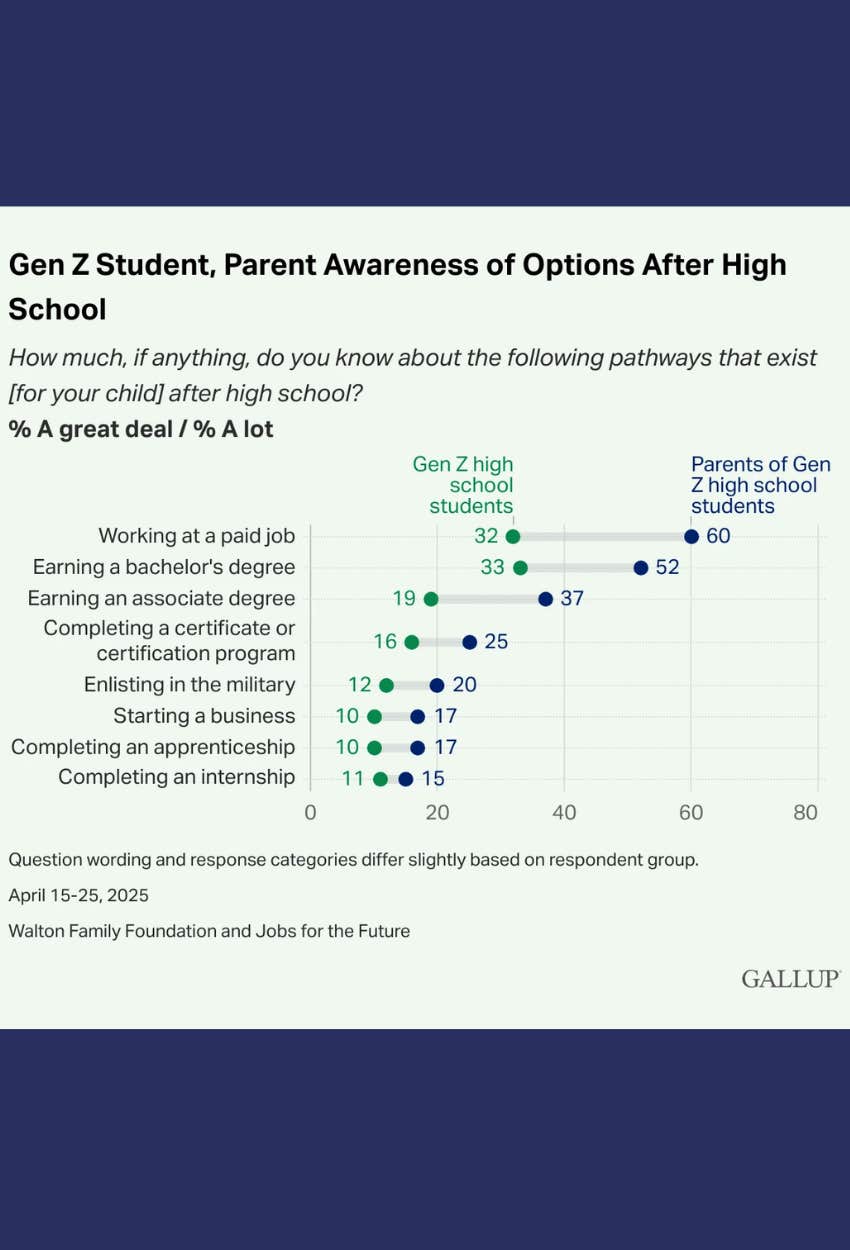Research Shows Most High School Students Have No Idea What Their Options Are After Graduation Other Than Get A Job Or Go To College
College or work aren't the only choices.
 Studio Romantic / Shutterstock
Studio Romantic / Shutterstock Life after high school is tough. Recent graduates face a whole new world of challenges and choices, and there's a lot of pressure to decide what they're going to do with the rest of their lives.
For many kids, college has lost its luster in light of the price tag, and the idea of taking out loans isn't appealing. Unfortunately, new research has found that students and parents aren't entirely knowledgeable about the options available to them immediately after high school.
A recent survey found that Gen Z students and parents aren't entirely aware of their options after graduation.
The survey, part of a study from Gallup, Walton Family Foundation, and Jobs for the Future, asked 1,327 Gen Z students aged 16-18 and their parents how much they understood about the different pathways a graduate can take.
 Gallup
Gallup
The options with the highest awareness for both students and parents were working at a paid job and earning a bachelor's degree. Earning an associate's degree was a close third option.
However, the parents of these students knew significantly more about these choices than the students did. Sixty percent of parents were aware of working a paid job as an option, while only 32% of students reported being aware. Similarly, only 33% of students reported having high awareness of the benefits of earning a bachelor's degree, compared to 52% of parents.
Students and parents had significantly less awareness of other, less 'traditional' options.
The survey participants had the most limited knowledge of experience-building opportunities, such as completing an internship or an apprenticeship. There are many career training programs that accept high school students or recent graduates, for example, and they can offer a huge leg up in this tough job market.
Students and parents were also fairly unaware of the option to start a business. Pursuing entrepreneurship out of high school is becoming much more common. The Yale Wave listed some options that students should think about if they want to start a business. The pros: follow your dreams, (potentially) make money, and learn valuable skills. The cons: risk of failure, limited options, and judgment from others.
Although it's not for everyone, many students and parents were also unaware of the options for enlisting in the military after graduation. Only 12% of students and 20% of parents claimed they knew a great deal about this option.
Though students may not be very aware of all the options, they are still interested in postgraduate life.
The survey showed that students showed enthusiasm about the options that they understood well. Forty-five percent of the student participants reported being "very interested" in starting a bachelor's degree program immediately after high school. Additionally, 40% reported having a strong interest in joining the workforce and getting a job.
 Xavier Lorenzo | Shutterstock
Xavier Lorenzo | Shutterstock
Students' interest can be increased even more by helping them prepare more for post-graduate life. Gallup noted that "On average, students whose parents discuss these postsecondary paths with them are twice as likely to show some interest in these options compared with their peers whose parents haven’t initiated such discussions."
It's never too early to start talking about post-graduation plans. According to the results of the survey, "While more parents of older than younger teens are discussing post-graduation plans, about one in three parents of high school seniors (35%) — those nearest to graduation — are not frequently discussing their child’s future after high school."
Parents, it's important to discuss the future with your teens and make sure they are fully aware of their options. There are numerous paths to success that don't involve immediately attending college or taking a minimum-wage job.
Kayla Asbach is a writer currently working on her bachelor's degree at the University of Central Florida. She covers relationships, psychology, self-help, pop culture, and human interest topics.

